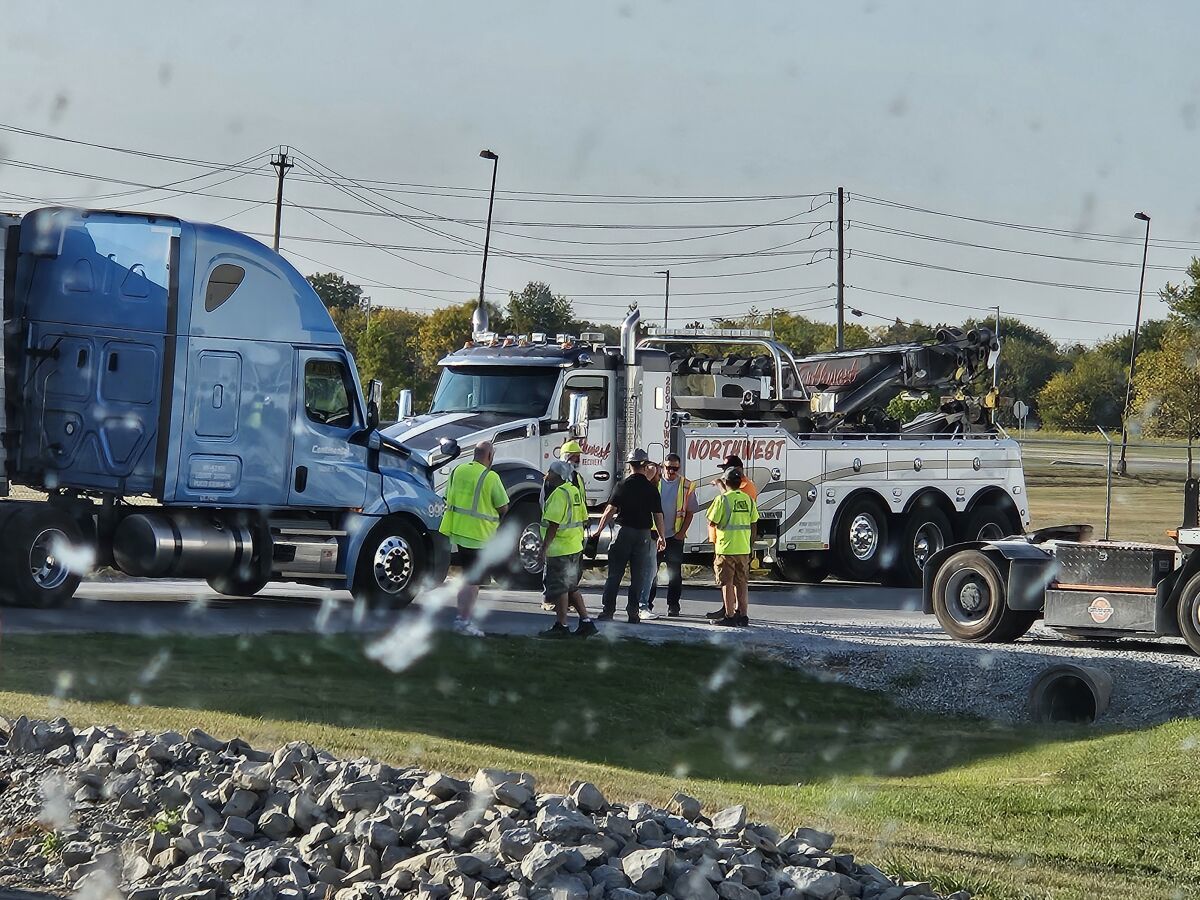A Good (terrible?) Reminder To ALWAYS Check Your Latch
Topic 34375 | Page 1
That's gonna be a big bill, and obviously a preventable

Somebody’s got some ‘splaning to do!
I’m glad it wasn’t you. When I saw your post I thought “Oh Oh”.
I'm thankful it wasn't me! The tow truck tried picking up the trailer, but the floor just came apart. Hand unload onto another trailer, and they are still cleaning it up.
It took them forever to figure out they could move two of the jersey barriers, move two trailers, and get us all out of there. I had that solution in 5 minutes, while I watched the guys scratching their heads and running around like headless chickens.
Oh well. I'm going to sleep!
Somebody’s got some ‘splaning to do!
I’m glad it wasn’t you. When I saw your post I thought “Oh Oh”.
That was a mess! Trucking will teach us things if we want to learn. The problem is, the lessons always seem to come at a cost.

We were just warned in our CDL school about checking that latch every time before we start driving again. And that it's often a result of vandalism disguised as "pranks."
Is there any legal & safe way to secure those latches? For example, lockwire with an anti-tamper seal?
CDL:
Commercial Driver's License (CDL)
A CDL is required to drive any of the following vehicles:
- Any combination of vehicles with a gross combined weight rating (GCWR) of 26,001 or more pounds, providing the gross vehicle weight rating (GVWR) of the vehicle being towed is in excess of 10,000 pounds.
- Any single vehicle with a GVWR of 26,001 or more pounds, or any such vehicle towing another not in excess of 10,000 pounds.
- Any vehicle, regardless of size, designed to transport 16 or more persons, including the driver.
- Any vehicle required by federal regulations to be placarded while transporting hazardous materials.
HOS:
Hours Of Service
HOS refers to the logbook hours of service regulations.
An old school method that always worked for me was to set trailer brakes, pull forward until you feel the truck won't go any further and set the tractor brakes. It has never failed me in my 44 years on the road. Just like you were taught to set trailer brakes and back up on the kingpin allows you to easily unhook the fifth wheel.
Hi Bob K. ,
The technique NavyPopPop described is really a good one.
The other thing is to always, without fail, do a visual inspection every time you are away from your rig when you come back. Even if you fuel up, pull ahead and go into the store, check it when you come back. If the rig is out of your sight, check the connection. This practice should be burned into your soul and brain. Also, when you connect to your trailer, stop before your tractor touches the trailer, get out and look to see if the king pin and fifth wheel are at the correct heights so you don’t high hook. That is another practice that should be part of every connection. Then, finally do a tug test to be absolutely certain everything has hooked up properly. I’ve never had anyone pull my pin, but it can happen. Be ever vigilant.
I always did a tug test before moving. Before starting my day, before pulling away from a dock, after fueling, etc. Always check. One minute of checking can save your day.
Every trailer, every time I hook, I goal and visually inspect the locking jaws are securely around the kingpin. I also goal and check 5th plate height before I get under it.
This is in addition to a tug test. I do a tug test at the start of every shift as well as any time I stop for fuel etc and it's our of my direct sight.
I did it like this from the start so it habbit, just automatic. Once conditioned, your body will do it without conscious thought.
Never high hooked. Never dropped a trailer. Visually inspecting is the only sure way and is cheap insurance against failure.
New Reply:
New! Check out our help videos for a better understanding of our forum features

















Preview:








 TT On Facebook
TT On Facebook
So, I am currently watching my 14 tick away, because a driver messed up, and dropped a trailer in a way he needs a tow truck to pick it up.
I was complaining ten minutes ago, about getting 5th wheel grease on my white hat when I ducked under. Not so upset about THAT now.